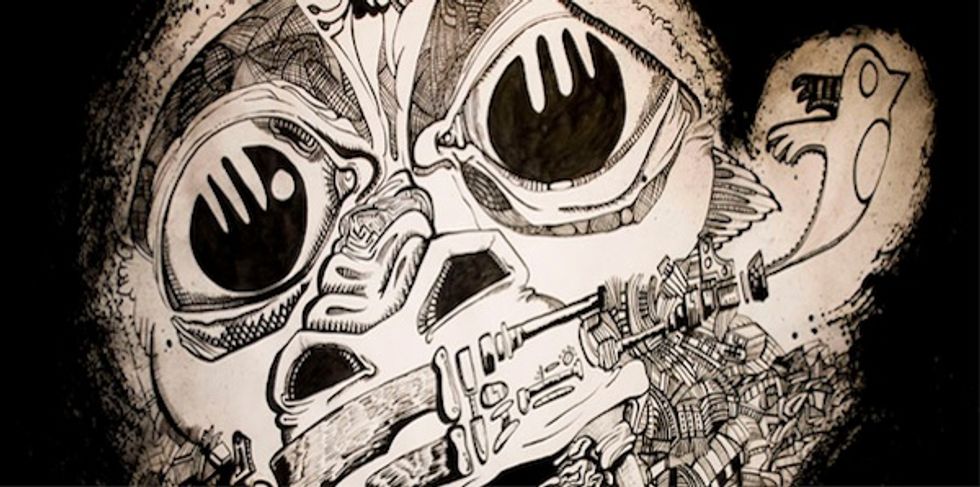MoCADA's Latest Exhibit: #NEWSFEED
Interview with co-curator Nelson Nance on MoCADA Exhibit: #NEWSFEED

MoCADA's latest curatorial series "#NEWSFEED" has been open for the past month, presenting several exhibits throughout Brooklyn. The series also provides public programming, which includes a Youth Photoshop and Social Media Workshop.
"#NEWSFEED: Anonymity & Social Media in African Revolutions and Beyond, features a compilation of new media art, contemporary works and digital installations that investigate global interconnectivity and how anonymous parties define, construct, and support uprisings in Africa via social media. As text, images and videos are tagged, re-tweeted, and shared virally, are these so-called “revolutions” reflecting real world events or merely constructing an online reality? How does this digital dialogue influence global society’s relationship with Africa?"
We spoke with Co-curator Nelson Nance last week and asked him a few questions about the exhibit:
1) Is this the first exhibit you've curated for Mocada, and can you explain a bit about why you and Jessica chose to explore this particular subject area?
Yes, This is the first exhibition I have ever had the honor of being a curator on along with Jessica here at MoCADA. Jessica and I came to this theme about a month into the fellowship while seeing what was going on with the revolt in Mali in comparison to the uprisings in Tunisa, Libya, and Egypt. We both were drawn to the social perceptions of the happenings; myself in the digital space and Jessica in the mass media space. The more we discussed what was going on we became interested in what these conversations would become in the art space, and...#NEWSFEED.
2)The title of the exhibit is immediately eye-catching- Can you unpack what it's meant to signify a bit for us?
I give all thanks and recognition to Jessica for that gem. I think I wanted to call the show something like WEBolution…horrible name I know. The name #NEWSFEED has a three fold connection for me; it has the initial allusion to your Facebook newsfeed which is where we started much of our research on the themes of the show. It also connects to our belief that this show was as much about educating patrons on the views of those within the revolutions as well as how they were viewed by the news media. Lastly for me the name represents a convening space. That's what I see social media as, and for some reason the hash tag symbol (even back in its number sign days) has always made me think of intersecting paths.
3) In the video you and Jessica mention that part of the exhibit comes from considering a history of black revolutions and how they are implicated in revolutions currently taking place around the world. Do you think that those protesting are aware of this relationship?
Well...yes and no. The blueprint more or less for many modern revolutions has been taken from the American civil rights movement. Interestingly that movement has some tactics and ideals whose lineage can be seen in parts from the South African Independence revolution from the turn of last century. That playbook is readily available and is being read and implemented…..partially. The things about those movements was that protest and riot were only the surface tactics were as now protest and riot are revolution and no longer just a tool. So people know that MLK marched and spoke but ignore the fact he was up all night arranging sit-ins, organizing people to flood media outlets to shut them down, or setting up carpool routes to keep people true to the bus boycott.
4) Do you feel as though this exhibit considers, or explores the relationship between MENA and Sub-Saharan Africa by looking this new age of social media revolutions and which social media revolutions actually became material revolutions?
The relationship between MENA and Sub-Saharan African revolutions was something we wanted to bring up, and it has definitely had an interesting turn as far as how those worlds are communicating in post revolutionary countries. Particularly in some countries they are hunting people with darker skin. These types of things do distress me and we have pieces that touch on those acts. Also there are definitely pieces that help to educate as to why certain areas had a faster or slower spread of information. In particular Sian Morrison of Kollective Mobile has created an iPad app that gives live stats of the internet usage and reach of specific African countries that have recently gone through or are experiencing political revolutions.
5) It's pretty clear through the different pieces that there's a really complicated relationship between social media and how people live their lives- what's your personal relationship with social media? Is it love or hate?
My relationship with social media? I gets down with twitter and tumblr free from all issues. Facebook annoys me… but my momma and sister are on there and i can see what they're up to. Hi momma!
6) In one sentence: what do you want viewers to take away from the exhibit?
Social media is a tool to use and revolution is a mindset that doesn't have to end.
With three different exhibits and a plethora of captivating and engaging art be sure to stop by at least one. Also watch the short video of curators, Jessica L. Moore and Nelson Nance, discussing their inspiration for the exhibit and see all details below.
MoCADA Brooklyn
#NEWSFEED
Anonymity & Social Media in African Revolutions and Beyond
October 18, 2012 – January 20, 2013
LIU Brooklyn + MoCADA Present
#NEWSFEED
Ghost in the Shell
November 15, 2012 – January 4, 2013
Public Installation | Entrance by Appointment
#NEWSFEED
Reconstructions of Experience
October 26, 2012 – January 10, 2013
Hours: Thursday – Saturday | 12pm – 6pm

